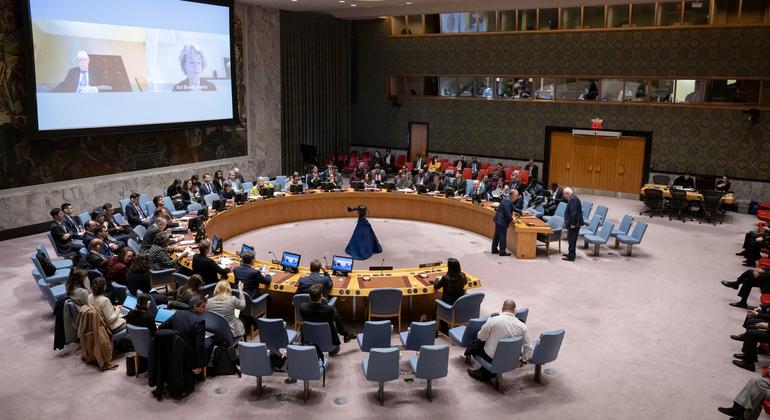4:48 PM
We must work towards Palestinian State: France
Nicolas de Rivière, Ambassador of France, which holds the Council presidency for January, spoke in his national capacity, saying efforts must focus immediately towards a lasting ceasefire, with the help of all regional and international partners.
“This is essential to enable the delivery of more humanitarian aid,” he said. “We must also remove obstacles to guarantee humanitarian access and fully implement resolutions 2712 and 2720 of this Council.”
France will continue to provide humanitarian, financial and material aid to the civilian population, he said, reiterating his delegation’s call for the immediate and unconditional release of all hostages.
“This Council must condemn in the strongest terms the terrorist attacks committed by Hamas and other terrorist groups on October 7, including sexual and gender-based violence used as a weapon of war,” he went on to say, adding that France will continue its action to establish sanctions against Hamas at the European level.
On the political level, France will continue to commit to the path of a rapid exit from the crisis based on the solution of the two States, both having Jerusalem as their capital, the only one that can make it possible to build a fair and sustainable peace,” he said.
“We must work to build a State for the Palestinians,” he said. “The Palestinian Authority has a central role to play in this process, in the West Bank as in Gaza, which aims to be part of this Palestinian State.”
Meanwhile, the Council recalled in its resolution 2712 that the forced displacement of civilian populations was contrary to international law. France also condemns the colonization policy, illegal under international law and a major obstacle to the prospect of a two-State solution, he said, emphasizing that it is crucial to avoid a regional conflagration.
4:15 PM
‘Robust action’ needed to end the war: China
Chinese Ambassador Zhang Jun said Gaza is a stain on humanity’s conscience.
“Nearly 100 days into the ongoing Palestinian-Israel conflict, more than 23,000 people in Gaza and over 200 UN personnel and journalists have lost their lives…all of these are not just cold numbers, but the loss of human lives,” he said.
Some countries speak constantly about promoting human rights and preventing genocide, but continue to deflect attention from the situation in Gaza.
“This is double standard, he said. “We need robust action to end the conflict. Any forced displacement of Palestinians must be firmly rejected.”
All measures must be taken to alleviate the humanitarian disaster, and a ceasefire must be declared with the utmost urgency. Only a ceasefire can prevent the two-State solution from collapsing, he argued.
“We urge the international community, especially countries who have influence on the parties, to make the realization of a ceasefire, the overriding task,” he said.
3:59 PM
No resettlement of Gazans: UK
UK Ambassador Barbara Woodward said her delegation firmly rejects any statements proposing that Palestinians should be resettled outside of Gaza, including those by members of the Israeli Government.
Alarmed by the record levels of extremist settler violence in the Occupied Palestinian Territory and its devastating impact, she called on the Government of Israel to not only condemn settler violence but also take direct action against those responsible for it, hold them to account, and ensure that Palestinian civilians are protected.
The UK is also intensely focused on ensuring more aid gets into Gaza, she said.
“Ahead of a permanent ceasefire, we want to see immediate and sustained humanitarian pauses,” she said. This will allow for hostages to be released and more aid to enter Gaza. In accordance with resolution 2720, “we call on Israel to allow for higher volumes of humanitarian aid, through as many routes as possible,” she said.
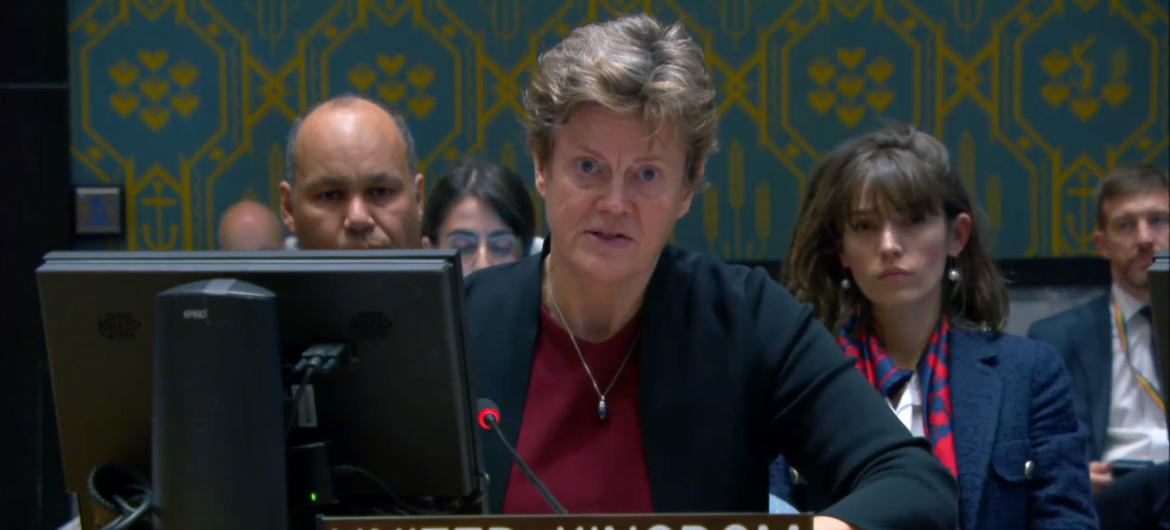
Ambassador Barbara Woodward of the United Kingdom addresses the Security Council meeting on the situation in the Middle East, including the Palestinian question.
3:48 PM
Immediate ceasefire, now: Russia
Russian Ambassador Vassily Nebenzia said the catastrophic situation in Gaza can be seen in the thousands of deaths and people buried under the rubble, widely destroyed civilian infrastructure and the two million who have been compelled to flee for their lives.
Those who were forced to leave have found refuge in UNRWA facilities.
While the 7 October attacks are reprehensible, they cannot legitimize Israel’s use of the force in the Gaza Strip, he said.
As the Council still fails to shoulder its mandate to implement a ceasefire, he regretted to note that the United States has stymied efforts to do so.
Making life unbearable in Gaza leaves the Palestinians no choice, he said, warning that the current situation could have dire consequences for the whole world.
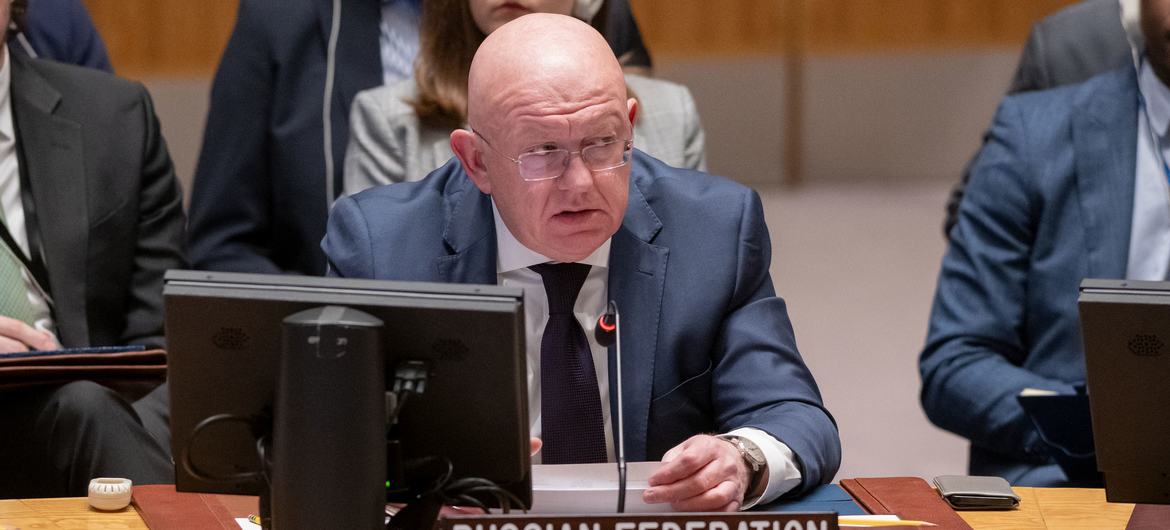
Ambassador Vassily Nebenzia of the Russian Federation addresses the Security Council meeting on the situation in the Middle East, including the Palestinian question.
Efforts are underway to prevent the mass deportation of Palestinians from their land, he said, citing international law and emphasizing that occupying Powers have clear obligations.
Plans for flooding Gaza would make the enclave uninhabitable, he said, pointing to South Africa’s case filed in The Hague this week and others brought before the International Criminal Court. What is striking are media reports of the idea that Israel would convince countries to take in Palestinians, he said.
“Russia’s approach is unchanged; we want an immediate ceasefire,” he said, raising concerns about a spillover of the conflict in the region, including in Yemen. “Without an immediate ceasefire, the Middle East risks plunging into a full-fledged war.”
3:40 PM
‘Work together to sow the seeds of peace’: US
US Ambassador and Permanent Representative Linda Thomas-Greenfield noted the humanitarian impact of the conflict precipitated by the 7 October terror attacks by Hamas and other militants.
With over 1.8 million Palestinians in Gaza internally displaced, she said that the situation is “heart-breaking and untenable”.
“The US position has been clear and consistent – Palestinian civilians in Gaza must be able to return home as soon as conditions allow,” she said, noting that her country has also made it clear that “civilians must not be pressed to leave Gaza under any circumstances.”
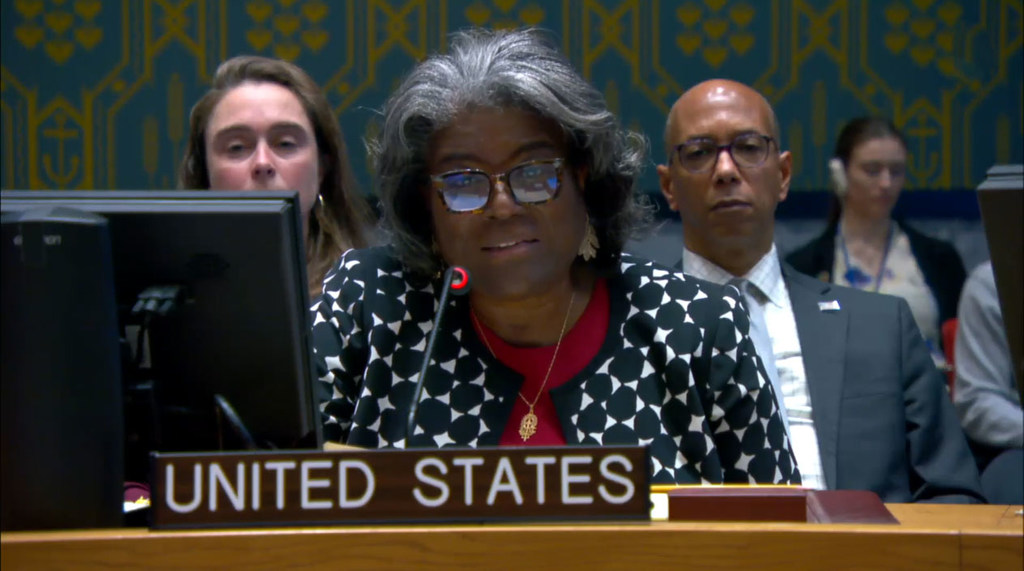
Ambassador Linda Thomas-Greenfield of the United States addresses the Security Council meeting on the situation in the Middle East, including the Palestinian question.
“We unequivocally reject statements by some Israeli ministers and lawmakers calling for a resettlement of Palestinians outside of Gaza,” she added, noting that such irresponsible statements make it harder to secure a lasting peace.
She also questioned why some Security Council members “still cannot bring themselves” to condemn the terrorist attacks by Hamas, speak of the plight of hostages, or censure the rocket attacks by Hamas and Hezbollah against Israelis.
“And why have some Council members refused to hold Hamas accountable for using civilians as human shields,” she said, urging all Member States to speak out and press Hamas and Hezbollah to “do what is necessary” to end the violence and displacement they have wrought.
Condemnation of West Bank settler violence
Ambassador Thomas-Greenfield drew attention to “unprecedented rise” in violence in the West Bank.
She condemned attacks by extremist Palestinian militants on Israeli civilians, as well as the attacks by Israeli extremist settlers targeting Palestinians and their properties, displacing entire communities.
“The US strongly opposes the advancement of settlements in the West Bank and we strongly oppose the violence that has come to characterize them.
“At their core settlements undermine the geographic viability of a two-State solution, exacerbate tensions and further harm trust between Israelis and Palestinians,” she said.
3:35 PM
‘Silence is complicity’: Algeria
Algerian Ambassador Amar Bendjama said shocking images are being beamed around the world on screens every day, without any meaningful response.
“What is happening in Gaza will remain a disgrace on the conscience of humanity,” he said. “Is it not enough to kill more than 23,000 people?”
The barbaric bombardment of the enclave and targeting of all signs of life in Gaza clearly “is a targeting of making Gaza uninhabitable” and kill the hope of returning home for Palestinians, he said, adding that this policy enjoys support from the occupying Power.
The goal is to terminate the Palestinian territory, he said, adding that the plan of forced displacement is unfolding now throughout the Palestinian territory through bombardment.
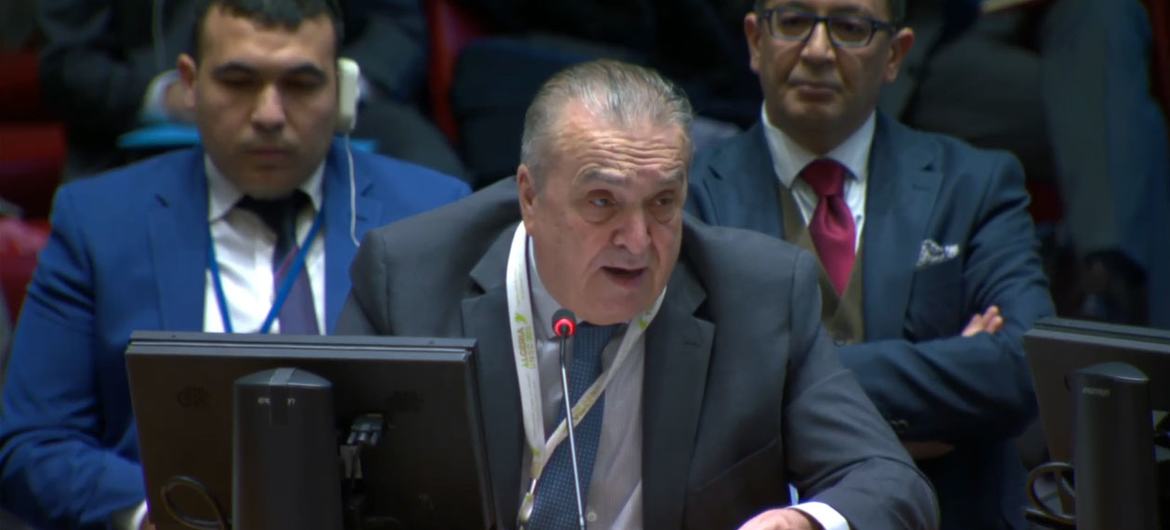
Ambassador Amar Bendjama of Algeria addresses the Security Council meeting on the situation in the Middle East, including the Palestinian question.
“This plan is destined to fail,” he said. “There is no place for Palestinians except on their land. Any displacement of Palestinians is a clear violation of international law.”
As such, the international community and the Council must speak in one voice against the displacement of Palestinians, he added. “Silence is complicity,” he said, reiterating the call for a ceasefire.
3:25 PM
Forcible transfer would be a war crime, warns senior human rights official
Ilze Brands Kehris, Assistant Secretary-General for Human Rights, began by highlighting what was “preventable” as the crisis deepens in Gaza and warned-about the sheer scale of suffering.
Emphasizing the need for accountability for the 7 October terror attacks on Israeli civilians, she stated, “its horror will not be forgotten.”
She said that Gaza’s situation is not a mere by-product of conflict but a direct consequence of the conduct of hostilities. She mentioned the displacement initiated on 12 October with Israeli authorities ordering Palestinians north of Wadi Gaza to move south.
Despite Israel claiming it was for safety, Ms. Kehris raised concerns about compliance with international law, suggesting potential war crimes.
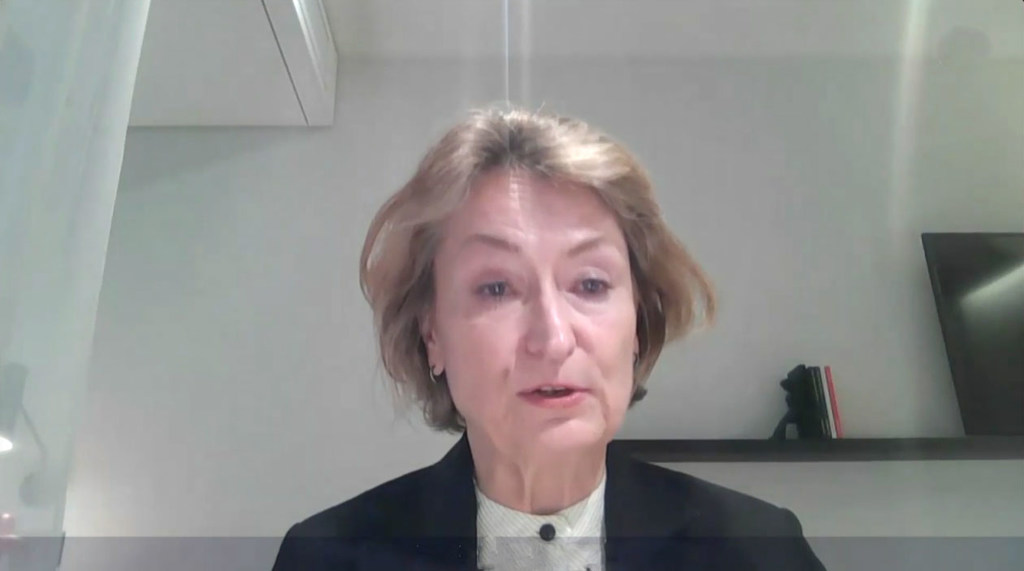
Ilze Brands Kehris (on screen), Assistant Secretary-General for Human Rights for the Office of the UN High Commissioner for Human Rights, addresses the Security Council meeting on the situation in the Middle East, including the Palestinian question.
“Such compelled evacuations, failing to meet the necessary conditions for lawfulness, therefore potentially amount to forcible transfer, a war crime.”
‘Confusing’ evacuation orders
“In fact, these orders have often been confusing, requiring civilians to move to so-called ‘humanitarian zones’ or ‘known shelters’ despite the fact that many such areas have been subsequently struck in Israeli military operations and the lack of any capacity in the shelters to absorb more people.”
Ms. Kehris further informed ambassadors of a “dramatic” rise in violence by Israeli settlers and Israeli security personnel in the West Bank, including East Jerusalem, and of statements by some members of Israel’s leadership pushing for permanent resettlement of Palestinians overseas.
Such statements have “entrenched fears that Palestinians are being deliberately forced out of Gaza and will not be able to return … this must not be permitted,” she said.
Need for durable solution
In conclusion, Ms. Kehris stressed the immediate need for a ceasefire and the unconditional release of hostages as crucial steps toward a durable solution.
“We must also look towards what comes next. This current violence comes in the context of decades of human rights violations,” she said, adding that for any enduring solution to the crisis, the underlying root causes must be addressed including “accountability for violations committed on and since 7 October, and in the many years before”.
“Ensuring justice and that the rights of all peoples – both of Palestinians and Israelis – are respected and protected is the only basis on which an enduring peace can be built.”
3:20 PM
Any Gazans displaced must be allowed to return: Griffiths
Humanitarian Affairs chief Martin Griffiths continued saying that efforts to send humanitarian convoys to the North have been met with delays, denials and the imposition of impossible conditions.
The lack of respect for the humanitarian notification system puts every movement of aid workers in danger, he said.
“Providing humanitarian assistance across Gaza is almost impossible,” he said. “Our access to Khan Younis and the Middle Area is largely absent.”
In these circumstances, the spread of hostilities further southwards would significantly increase pressure for the mass displacement of people into neighbouring countries, he said.
“I want to emphasize that any persons displaced from Gaza must be allowed to return, as international law demands,” he said, expressing deep alarm by recent statements by Israeli ministers regarding plans to encourage the mass transfer of civilians from Gaza to third countries, currently being referred to as “voluntary relocation”.
Any attempt to change the demographic composition of Gaza must be firmly rejected, he said.
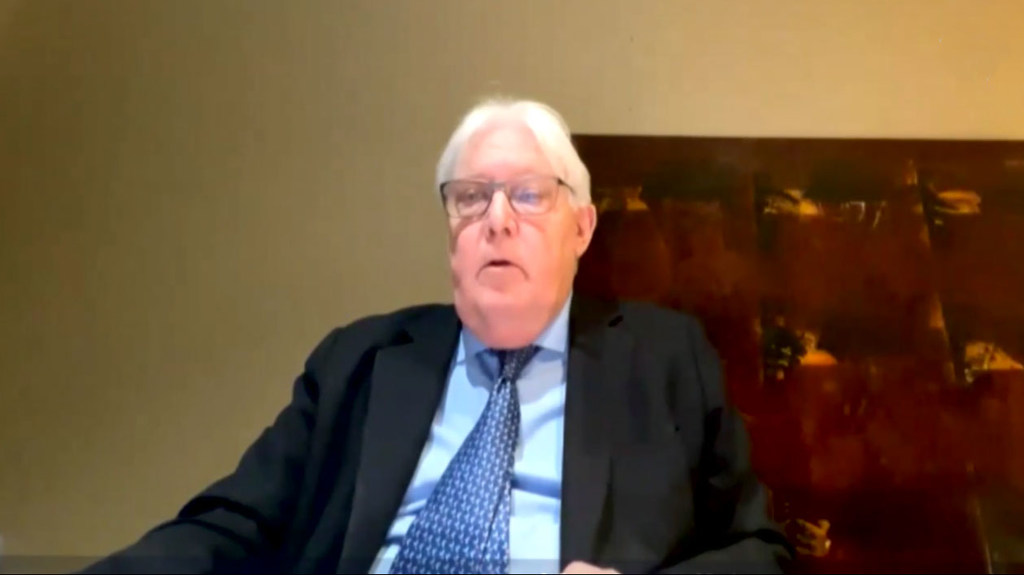
Martin Griffiths, Under-Secretary-General for Humanitarian Affairs and Emergency Relief Coordinator, briefs on the humanitarian situation in Israel and the Occupied Palestinian Territory.
While Gaza is the epicentre of this crisis, he said “let us not forget the 1,200 people killed, thousands injured and hundreds taken in the brutal attack by Hamas and other armed groups on Israel on 7 October, and the accounts of abhorrent sexual violence”.
More than 100,000 people have been displaced within Israel as a result of the 7 October attack by Hamas and other armed groups and due to ongoing rocket fire from armed groups in Gaza and Lebanon.
In this vein, he expressed continued concern about the risk of a further regional spread of this conflict.
Stain on our conscience
“What we have seen since 7 October is a stain on our collective conscience,” he said. “Unless we act, it will become an indelible mark on our humanity.”
People will continue to suffer and die from the rockets, the bombs, the missiles and the bullets and in increasing numbers from starvation, disease and exposure, he said.
“We cannot let this happen,” he said, reiterating his call for a ceasefire, for the Council to take urgent action to end the war.
He also repeated his call for far greater compliance with international humanitarian law, including the protection of civilians and the infrastructure they depend on; the provision of essentials for survival; the facilitation of humanitarian assistance at the scale required; and the humane treatment and immediate release of all hostages.
3:07 PM
‘Scenes of utter horror’ in northern Gaza: UN relief chief
The UN’s Emergency Relief Coordinator, Martin Griffiths, is speaking first. He told ambassadors that what has been unfolding in Israel and Gaza is a war conducted “with almost no regard” for the impact on civilians.
Relentless military operations continue in Gaza, with tens of thousands killed and injured – the majority women and children.
“We can see it in the forced displacement of 1.9 million civilians, a staggering 85 per cent of the total population, traumatized and forced to flee again and again as the bombs and missiles rain down, and we can see it in the appalling conditions on ground: shelters overflowing, and food and water running out, with the risk of famine growing by the day,” he said.
Health system devastated
The health system is in a state of collapse. Now winter has arrived in Gaza, bringing with it bitter cold, exacerbating the struggle to survive. This makes it all the more deplorable that facilities critical to the survival of the civilian population have come under relentless attack, he said.
In total, 134 UN relief works agency, UNRWA, facilities have been hit and at least 148 UN personnel and non-governmental organization (NGO) staff have been killed in Gaza.
Humanitarian sites have been struck on numerous occasions, despite their identification and notification to the Israeli Defense Forces. In the last few days alone, two NGO premises have been hit.
Orders for evacuation are unrelenting. As ground operations move southwards, aerial bombardments have intensified in areas where civilians were told to relocate for their safety.
More and more people are being crammed into an ever-smaller sliver of land, only to find yet more violence and deprivation, inadequate shelter and a near absence of the most basic services.
“There is no safe place in Gaza,” he said. “Dignified human life is a near impossibility.”
3:05 PM
France’s Ambassador, Nicolas de Rivière, is chairing the Council for the month of January and he’s just gavelled it open.
3:02 PM
Both of the senior UN officials will be briefing ambassadors via videolink, and they’re in vision already waiting their turn to speak, on a giant screen above the iconic horseshoe table.
Both Israel and Palestine are going to have the chance to speak, likely at the end of the meeting.
Relief chief Martin Griffiths along with Ilze Brands Kehris, Assistant Secretary-General for the UN human rights office (OHCHR) are expected to brief ambassadors at the open meeting, called for by new Council member Algeria, whose ambassador has made clear he intends to represent the Arab voice in world affairs at this crucial time on the Council.
The meeting comes as tensions and threats increase across the whole Middle East, with alarming exchanges of fire along the Israel-Lebanon border, as well as attacks by Houthi rebels in Yemen on international shipping in the Red Sea.
On Thursday night, the United States and the United Kingdom retaliated against Houthi positions inside Yemen, an escalation that is directly linked to events inside Gaza as the rebels make common cause with Hamas.
Earlier this week, on Wednesday, the Council held closed-door consultations where it considered a report by the Secretary-General on the implementation of resolution 2712, which among other points, called for “urgent and extended” humanitarian pauses in Gaza, as well as an immediate release of hostages.
Also on Wednesday, the 15-member Security Council adopted a resolution strongly condemning the attacks by Houthi rebels off the coast of Yemen. The resolution passed with 11 votes in favour, with four abstentions: China, Russia, Algeria and Mozambique.

